- Home
- Mack Reynolds
Ability Quotient Page 4
Ability Quotient Read online
Page 4
Bert glared at him. “Through that math, through elementary ethnology and ancient history one. If I hadn’t been bombed with that drink, I probably…”
“All right, all right,” Marsh cut him off. He bent over his briefcase and began extracting medical equipment. “You are doing even better than we had hoped.”
“Listen, who’s we, and what’s this all about?”
“All in good time.”
“All in good time, hell. I want an answer, Marsh. For all I know, this turn on, turn off stuff will turn my brain into mush after a few sessions. It’s obviously based on some psychedelic—”
“No, not exactly. We’ve gone far beyond the early psychedelics.”
“Kay. It’s not my field, but I object to being the first customer cruising through this rat maze. I want some answers. ”
The professor was loading a hypodermic nonchalantly. “I’m afraid it is not my position to tell you, Alshuler. In good time, I am sure Leonard Katz will make you privy to the fullest details.”
Bert stared bafflement at him.
“Your trousers, please,” Marsh told him.
The other ignored him and stabbed him expertly and took up another needle. “Have no fears.”
“What do you mean, have no fears? I take up a glass of whiskey and it knocks me for a loop. How do I know what comes next? You’re lousing up my metabolism, or whatever you call it First thing I know, I’ll break my arm picking my nose, or something.”
“Very amusing, I’m sure,” Marsh murmured, returning his things to his briefcase. “And now, I’ll drop in on you the same time tomorrow.”
“Wait a minute,” Bert snapped. But the other was gone.
The younger man stared after him in high irritation.
Something came to him. He reversed his engines and went into the study and took down one of the brown pills. He went to the shelves of reference books and fiddled around for a time before coming up with the term he wanted.
He marched over to the auto-teacher, activated the screen and said, “I want a course in neuro-physiology.”
“The next course is English Literature One, Beowulf to Chaucer.”
“I’ll take that one later. I want to bone up on…”
The screen lit and there was a book there. The screen voice said, “English Literature One…”
Bert glared at it. “We’ll see about this,” he snarled and flicked the screen off, taking a childish pleasure in being able to do so.
He sat there for a while, thinking about it, then got up and went over to the desk. He sat down before the library booster screen, dialed the National Data Banks and said, “I want a listing of books in English dealing with neuro-physiology.”
The screen said, “Please put your identity card in the slot.”
“Why?” Bert demanded.
“So that we may check your priority rating, sir.”
He grunted, brought his identity card out and stuck it in the slot. A listing of books appeared on the screen. There were surprisingly few of them and, by the titles, were aimed at the layman and on a rather elementary level at that.
Bert said, “I am able to study on a higher level than this. I want the latest material on the subject.”
“Your priority rating is One. Such volumes are not available to your priority rating, sir.”
He dialed the National Data Banks again and said, “Information. What is a college student’s priority rating?”
The screen said, “To whom does a priority rating of One apply?”
“To the mentally retarded, convicted criminals, children below the age of ten and those with less schooling than the fifth grade.”
He closed his eyes in pain for a moment, then said, “I am Albert Alshuler Caine, Identity Number 454-K-872-R-1245. I am a discharged veteran of the Asian War, rank Major. Medal of Honor, Distinguished Service Cross, Bronze Star and Silver Star, both with clusters. There is a mistake in my National Data Banks priority rating. I wish to have it protested.”
There was a long moment before the screen said, impassively. “There is no mistake in your priority rating, sir. However, since you have protested, the matter will he investigated. You will be notified.”
Chapter Five
Well, there was nothing more he could do with the data bank foul-up at this point. He returned to the auto-teacher, sighed and sat down before the screen. “Kay,” he said. “English Literature One.”
The screen lit up and he began to flick pages.
When he had finished, he looked down at his chronometer and scowled. If anything, the second hand seemed to be going slower than ever. He wondered if this thing was accelerating. He went on to Elementary Chemistry and on completing that suddenly felt weary of it all. He took one of the green pills, sat down at the desk phone screen and gave Jim Hawkins’ identity number.
Jim’s less than handsome face faded in. He was obviously on his pocket transceiver phone. He said, “Hi, old buddy. Where’ve you been?”
“Getting over a hangover. Where are you?”
“Auto-Cafeteria 32. It’s on the ground floor of the Ad building.”
“See you,” Bert said.
In the hall, as he waited for the special elevator, he looked up and down the corridor. He could see the doors of four other suites and he wondered vaguely who lived in them. Marsh had said that this level was reserved for V.I.P.s.
On the street level, he had a little difficulty in locating the Auto-Cafeteria, since the building was largely strange to him. However, he asked questions a couple of times from passing students and found it. The students evidently took him for an instructor, his age being what it was, and possibly his conservatively cut but expensive clothing being unlike their own.
Auto-Cafeteria 32 was on the large side and even at this time of day must have held two thousand. He wandered around until he finally spotted Jim Hawkins who was sitting at a table with three others. As Bert Alshuler came nearer he recognized Jill Masterson, the perky little brunette Jim was currently hot after. The others were strangers.
Jim introduced them and last names were promptly forgotten They were named Clyde and Betty, had some classes in common with Jim—and seemed incredibly young and naive to Bert Alshuler. Why not? He was less than ten years their senior but had lived ten times the amount of life.
He had grinned a hello to Jill and she had smiled her generous smile back at him.
As he took a seat, she said, “I owe you a beer. I’m springing.”
Jim Hawkins groaned. “The second time she sees him, she’s buying him drinks. What a sheik.” He took in Bert’s clothing. “Holy Moses, where’d you get the glad rags?”
“Holy Moses?” Bert said. “Glad rags? The only place I’ve ever heard those terms was on historic Tri-Di shows.”
“The latest thing,” Jim said airily.
Jill had summoned a beer for the newcomer. Now she said, “It goes in cycles The latest thing is to use the terminology of our grandfathers. Heavens to Betsy, it’ll only he a matter of time before 23 Skidoo comes back in.”
“I love my wife, but oh you kid,” Bert told her, taking up the beer. He sipped it cautiously, in memory of the last drink he had taken. However, there was no subversive effect.
“Mind your language,” Jim told him. “You’re talking to the woman I love.” He looked at Jill accusingly. “You didn’t tell me that Chaucer course wasn’t in English.”
Bert said, “Chaucer wrote in English, Jim. It was just that it was Old English. He wrote back in the 14th Century.”
Jim scowled at him. “It doesn’t sound like English to me, and doesn’t look like it.”
“You’ve got to develop an ear for it, is all. For instance, take this from the Canterbury Tales:
“Ful wel she soong the service dyvyne,
Entuned in hir nose ful semely;
After the scole of Stratford atte Bowe,
For Frenssh of Parys was to her unknowe.”
Jim looked at him in disgust. “That�
��s Greek to me.”
But Jill was frowning questioningly. “Bert, you just don’t look like the Chaucer type.”
He shrugged. “I had an opportunity to study him a little.”
Clyde looked at his watch. “Hey, Betty, we’ve got French.” The two younger students stood.
Jill got up as well. “I’ll go along with you. I’ve got some moving to do So long, Jim. See you, Bert.”
The two men left at the table looked after her as she went off, chattering brightly with the two others. She had a quick, cute charm, but there was no connotation of her being a lightweight. Her figure, tiny as it was, was perfect, and Jim sighed deep down.
Bert stood and said, “Come along, I’ll buy you a real drink.”
Jim uncoiled his lanky self from his chair. “A real drink? Are you kidding? I keep telling you, for as long as we’re in this racket we can’t even afford all the beer we’d like. Where’d you get those grand duds?”
Bert ignored the question and led the way through the mass of tables back to the elevator row.
Jim looked at the elevator as they stood there at the end of the bank. “Hey, this isn’t for us, old buddy. This is some kind of private deal for the high mucky-mucks in the faculty.”
However, the screen had identified Bert Alshuler and the door opened. Jim followed him inside, wonderingly.
Bert said, “Suite G.”
“Yes, Mr. Alshuler.”
Jim’s eyes widened.
Bert said, “What kind of a priority does your identity card give you on the National Data Banks?”
Jim looked at him. “Three. It’s the same with all students, except some fields like medicine or nuclear physics. You’ve got to be cleared for some of the material in them.”
Bert shook his head. “Mine’s all fouled up. I’m protesting it.”
When they got to the top floor, Jim Hawkins followed him blankly as he led the way to Suite G. Several times his lips moved as though he was about to blurt a question, but he held silence. Bert Alshuler would have enjoyed the whole thing more if he hadn’t been so full of questions himself.
The door screen identified him and opened as they approached.
Jim Hawkins, hands on hips, stood in the middle of the living room and stared about.
“How in the devil did you get in here?” he demanded, “What’re you doing here?”
His war time companion led the way to the bar. “I had to promise to keep it all secret before I fell into this deal. I’m not paying for it. It’s a special arrangement with one of the professors.”
Jim shook his head in admiration. “Kind of babysitting, eh? The old boy wants kind of a guard in a place like this while he’s gone.”
“Not exactly,” Bert told him, unhappy at being less than candid with his best friend. “Anyway, how about a belt?”
“Holy smokes, he even lets you drink his liquor?”
“That’s right,” Bert said, reaching his hand out for the bottle of stone age Scotch which had laid him low the day before. “I hate to use you for the royal taster, old buddy, but how about a slug of this?”
“Why not?” Jim leered.
“Because it floored me yesterday,” Bert said, pouring the other a hefty amount.
The other chuckled amusement. “You never could hold your booze, old buddy.”
“I warned you.”
Bert’s lanky companion knocked the drink back with nonchalant ease, “Man,” he said, “that’s sippin’ whiskey.”
Bottle in hand, Bert watched him. Nothing happened. Bert sighed and filled the other’s glass again and poured a drink for himself.
He motioned to the bar and said, “Make yourself at home, Jim. Meanwhile, lend me your Identity Card.”
“What?”
“Your Identity Card. I told you mine was fouled up. I’ve got a priority One and I want yours to order up a book or so that I need for something I’m working on.”
“It’s against the law to lend your Identity Card.”
Bert said, “Since when did you give a damn about the law—particularly where I’m concerned, old buddy?”
The other sighed and handed over the card.
Bert said, “I’ll be an hour or so. Help yourself to the liquor. There’s a library booster screen on the desk. There’s one in every room in this place Do some of your homework, or look up some books, whatever. There’s a king-size Tri-Di box over there.”
“Take your time, take your time,” Jim gushed, eyeing the bar with a fond eye.
Bert left him and went to the study. For the first time, he noticed that the door had a key on the other side. He locked the door behind him and went over to the desk with its library booster screen. He put his friend’s Identity Card into the slot and dialed for the list of books on neuro-physiology.
Since he was completely at sea in the subject, he had difficulty finding what he wanted. When finally he had a book that looked promising, something came to him and he stood and went over to his bottles of pills. He took a brown one and went back to the screen.
He skimmed one book, skimmed another, got a smattering of background and terminology, but wasn’t happy. His texts would mention some reference to another work which was then found to be beyond his priority Three card. It mystified him. Did you have to be a doctor of medicine, or even a specialist in this field before its full literature was available? He could see that various works in say, nuclear physics, might have to be banned to those without clearance There were evidently methods of constructing nuclear mini-bombs in a home laboratory these days and obviously the information couldn’t be made available to every crackpot that came along. But medical information pertaining to the brain? Who could care that the information be available to anyone who could understand it?
Various passages gave him pause. Early in his research he ran into: “… Three major areas of excitement and progress can be detected among the numerous enquiries in the field. First, there is a growing power to intervene in the non-intellectual functions of the brain: a growing ability to alter moods and emotional states—a development which is based on the realization that the brain is not simply an electrical or computer-like mechanism, but a complex chemical system as well. Secondly, a spirit of extreme optimism has sprung up concerning the possibility of discovering the nature of memory. Finally, there is a guarded belief that one may be able to effect considerable improvement in the level of intelligence of future generations.
He sat back for a moment and ran the palm of his right hand over his lips. The passage had been written more than two decades previous.
Later on, he came up with: “… the brain is a complex chemical device. Its parts respond in subtle ways to the influence of substances in the fluids which bathe them, and contain specialized chemical agents—gangliosides, cerebrosides, sphingomyelin and so on—the functions of which are still obscure.”
He finally looked at his wrist chronometer. He couldn’t leave Jim Hawkins alone indefinitely. The other was probably already wondering what Bert was doing so long with his Identity Card. The second hand on his watch seemed to be barely crawling. He snorted inwardly and realized that he hadn’t checked the time when he had first entered the study, so he didn’t know how long he had been at his books. He had better return.
He went over to his pills and took one of the green ones and then unlocked the door and returned to the living room.
Jim Hawkins was at one wall, glass in hand and staring owlishly at a display set in the wall that Bert Alshuler hadn’t realized was there. Evidently, the other had opened some panel that had been sunken in such a way that a casual inspection wouldn’t indicate its presence.
Bert came up behind him. “What’s this?” he said.
Jim, frowning, said in gentle reproof, “Old buddy, didn’t you know it was illegal for private citizens to possess laser weapons?”
Chapter Six
“Laser weapons?”
Bert stared into the case. There were, neatly displayed, a dozen fi
rearms, ranging from gyro-jet pistols and carbines, to, yes, two laser pistols and even a folding type laser rifle. To Bert’s experienced eye, the latter seemed on the sophisticated side, more compact than the arms with which he’d been familiar in the Asian War. Evidently, the very latest.
“Maybe they’re just models,” he said, reaching out for the larger of the lasers.
Jim, who was looking a little blurry around the edges as a result of the sampling of the bottled goods, snorted. “With that machining?”
His old comrade in arms handled the weapon professionally, expertly. He slapped the side and dislodged the power pack. There was a red dot at the top.
Jim muttered, “Loaded.” He looked at the other laser hand guns “There’s enough firepower here to bring down half of this building. And look at that supply of extra power packs; ammo enough to stand off a division.”
Bert put the folding rifle back into its place. He said unhappily, “The professor told me that the suites upon this level were for V.I.P.s. The last occupant of this one was the president himself. I suppose they get a lot of visiting foreign dignitaries, that sort of thing. Maybe the Department of Security has this little cache here for emergencies.”
“Some little cache,” Jim said skeptically.
Bert looked at the tiny keyhole in the secret door, then at his companion. “How’d you find this, and how’d you ever get the lock open?”
Jim looked innocent. “Didn’t I ever tell you what I did before the army snagged me?”
“No.”
“I was an apprentice second story man.”
“Second story man? What in the hell’s that? More of your grandfather’s slang?”
“Secondary story man, second story man; a burglar.”
Bert winced. “My old buddy,” he murmured. “What’d you mean, apprentice?”
“It runs into the family,” Jim told him earnestly. “My old man was breaking me in.”
“Oh, great. I thought the army didn’t induct felons.”
“Felon?” Jim said indignantly. “We weren’t amateurs. My family hasn’t taken a fall in three generations. There’s nothing on my police record any worse than a couple of traffic violations.”

 Happy Ending
Happy Ending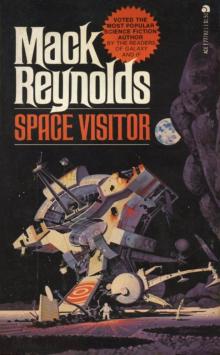 Space Visitor
Space Visitor A Kiss Before Loving
A Kiss Before Loving Episode on the Riviera
Episode on the Riviera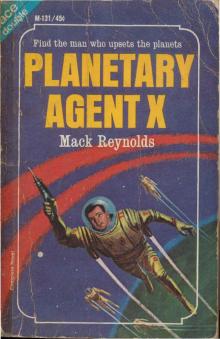 Planetary Agent X
Planetary Agent X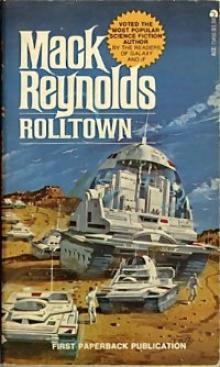 Rolltown bh-3
Rolltown bh-3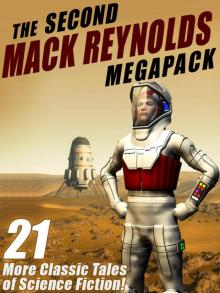 The Second Mack Reynolds Megapack
The Second Mack Reynolds Megapack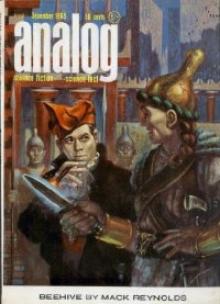 Dawnman Planet up-2
Dawnman Planet up-2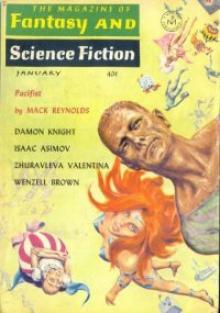 Pacifist
Pacifist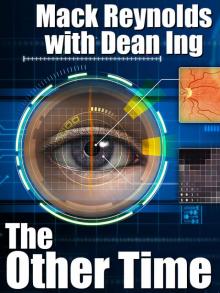 The Other Time
The Other Time Once Departed
Once Departed IQ
IQ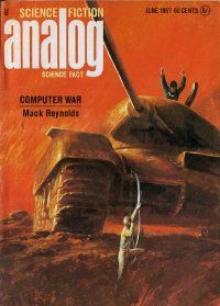 Computer War
Computer War Earth Unaware
Earth Unaware The Rival Rigelians up-3
The Rival Rigelians up-3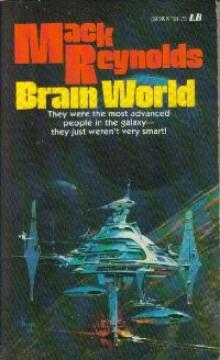 Brain World up-7
Brain World up-7 Star Trek - TOS - Mission to Horatius
Star Trek - TOS - Mission to Horatius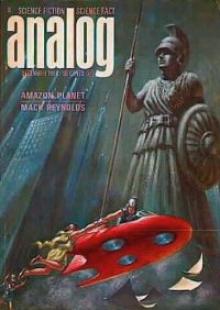 Amazon Planet up-5
Amazon Planet up-5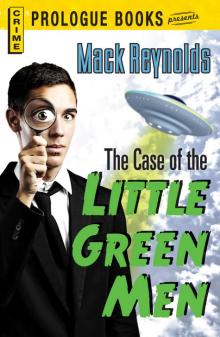 The Case of the Little Green Men
The Case of the Little Green Men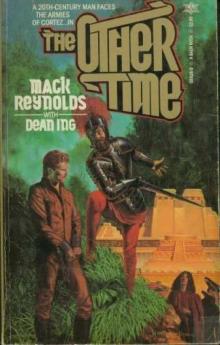 Other Time
Other Time The Mack Reynolds Megapack
The Mack Reynolds Megapack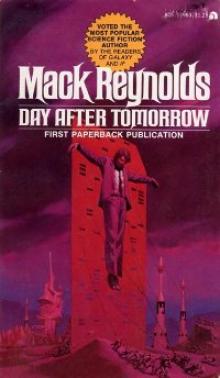 Day After Tomorrow
Day After Tomorrow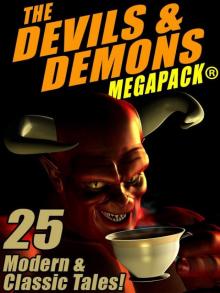 The Devils & Demons MEGAPACK ®: 25 Modern and Classic Tales
The Devils & Demons MEGAPACK ®: 25 Modern and Classic Tales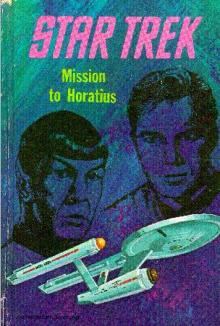 Mission to Horatius
Mission to Horatius Ability Quotient
Ability Quotient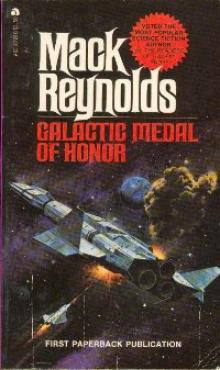 Galactic Medal of Honor
Galactic Medal of Honor Trojan Orbit
Trojan Orbit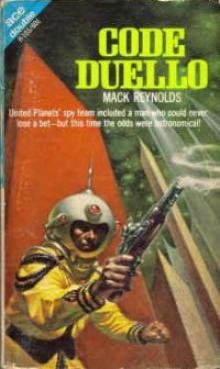 Code Duello up-4
Code Duello up-4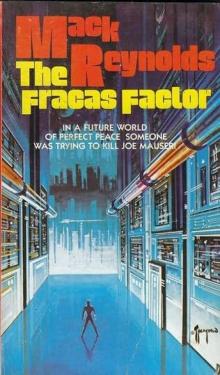 The Fracas Factor
The Fracas Factor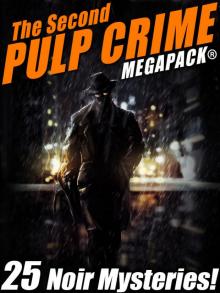 The Second Pulp Crime
The Second Pulp Crime Deathwish World
Deathwish World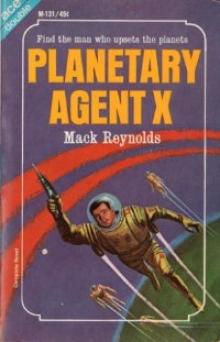 Planetary Agent X up-1
Planetary Agent X up-1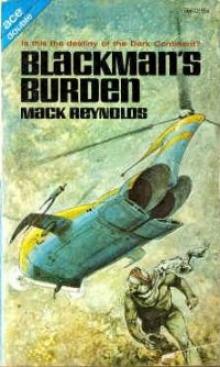 Blackman' Burden na-1
Blackman' Burden na-1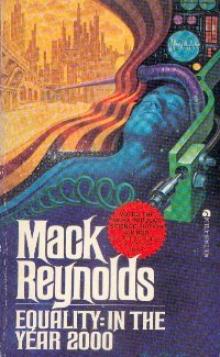 Equality: In the Year 2000 jw-2
Equality: In the Year 2000 jw-2 The Best Ye Breed na-3
The Best Ye Breed na-3 The Jet Set
The Jet Set The Rival Rigelians
The Rival Rigelians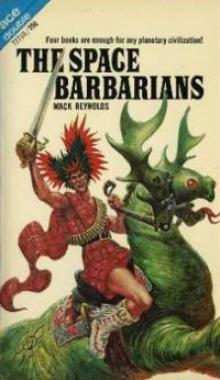 The Space Barbarians
The Space Barbarians